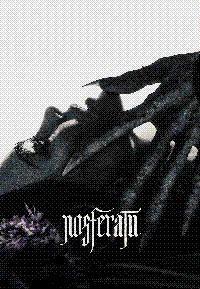
First, some captivating individual framings; Eggers does have some knack or talent for directing, but man does this whole film feel kind of lacking at least from an aesthetic viewpoint. I genuinely think Tim Burton would have benefited more from remaking this than Eggers, but whatever.
He does explore something intriguing as to “feminine desire” and how it might relate to sexuality, even if it doesn’t really come to fruition all that clearly. Themes are shaky, how the movie is shot as a whole is kind of shaky, overall just a pretty shaky movie that keeps you engaged for its over 2-hour runtime but doesn’t grasp at anything completely. Maybe unfinished? Perhaps rushed?
Rating: Nosfera-poo! Two thumbs down, yet one thumbs up for trying.

Rating: Cel animation is still better than CGI though
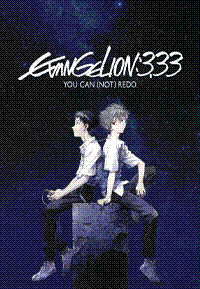
Something worth commenting on is how drastically different this is from End of Evangelion as well as 2.0--how much more empty the world feels, the obvious change (or, what I would like to think, a "growing up") in the art style, and the obvious growth the rest of the characters have gone through... it's much different and I think it services the film quite well. One thing that kind of irked me in the previous movie is that it kind of felt redundant(?) This one feels like we're moving, we're heading towards something narratively.
A common criticism I see from people who hate the rebuilds is that it diverges too much from the main storyline that was present in 1.0, but I don't know. To me, as a guy with no stake in the game, it kind of seems like that's the point. I think there is a sort of resentment of itself that's permeates throughout Evangelion which is most prominent in End of Evangelion, and the rebuilds are sort of a divergence from that resentment. It's not that bad!
Rating: More like Evangelion: Pee.0!
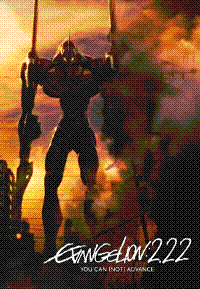
I had a friend who was really into it. He would talk about it all the time and go on about how it changed his life and stuff. One day he brought up that we (me, my friends, and him) should all watch it together, in one go: one night--from the television series to End of Evangelion. So we watched the television series. And then End of Evangelion. And then I just went to sleep, confused and unsatisfied. To be charitable, watching all 26 episodes + End of Evangelion in one sitting is an exhausting exercise of willpower--halfway through the television series I could already feel myself losing grip on my consciousness, but I pulled through for my friend's sake. By the time we got to End of Evangelion, I was ready to tap out, and having been delirious seeing all the freaky shit that happens during the Third Impact probably didn't help its case. Anyways, that's just my background when it comes to Evangelion. My review:
Something really interesting to me about Evangelion in its entirety is that it almost requires you to engage with supplementary material to understand it if you didn’t grow up with it. As someone who didn’t really “get” End of Evangelion, I can’t really say I get this one either--however, I do understand it a little bit more. The themes here aren’t necessarily hard to grasp (isolation, the exploitation of children, impacts of technology, etc) and it is really dense with these themes, but I can’t help but wonder why these themes needed to be presented through the modes the film chooses it to be presented through. There’s an unnecessary amount of fan-service (I can’t really be convinced that it serves a greater, subversive purpose) that definitely soured my taste watching this. Draped in pretty incredible animation and aesthetically pleasing imagery and symbolism--I admit, it all looks very cool--is a story that follows a buildup contained with unsatisfactory character development to a climax that, albeit visually pleasing, wasn’t personally satisfying either. Maybe it’s because I haven’t watched the original anime series in a while, but I didn’t really care for Shinji’s relationship with any of the other characters. Every scene that presented the “emotional development” between the characters felt slightly forced, with very stereotypical methods of depicting those developments, i.e. “He made lunch for me and was nice to me, I must like him!” There’s nothing wrong necessarily with building up relationships and love through such means, but it feels misplaced here for Evangelion, I think. Anyways, I hope 3.0 is good--not saying this is bad, but I can’t say I liked it all that much.
Rating: More like Evangelion: Poo.0!
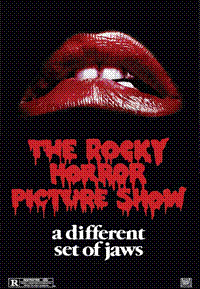
I can see why this is a cult classic.
The aesthetics of this film (particularly through its set pieces) are definitely unique, and solely the representation of a “trans” character is enough to get its foot through the door for some people, but to me it’s just fine. It looks pretty good and is good fun, but there’s nothing more that it offers for me other than that. Very “weird” and disjointed and all over the place in ways that aren’t really satisfying.
There are parts I find a bit problematic: the depiction of Frank-N-Furter as a transvestite is all well and good, but it doesn't sit well in my stomach when the 'display' of sexuality manifests in this sort of overtly perverted nature; for example, when Frank sexually assaults -- really, they rape -- both Brad and Janet in their rooms, it doesn't really play well as a gag. It only really exists to depict Frank as a pervert and predator. There is merit in portraying under-represented demographics as villainous and disgusting, but for me it doesn't seem like there is any of that introspective justification or thought put behind portraying Frank as such -- the gag is that they are a rapist, in this case.
Now, understandably, this is a parody of science fiction. The costumes and set design are all very goofy and cartoonish exaggerations of subjects and settings commonly found throughout science fictions, especially during the 60-70's, added with a bit of 'gay' flair. I understand the appeal of this film through an aesthetic standpoint; I also understand its appeal when it comes to Frank as a character as well, at least with their mannerisms. Tim Curry's performance is definitely and most obviously the strongest out of the entire cast, overshadowing the sort of bland and seemingly lack of effort that is present in the rest of the performances. The only one second to Curry's is Susan Sarandon's performance of Janet, who gives a slightly over dramatic but tongue-in-cheek and endearing damsel act.
It's a fun film! It's random and a bit disorienting, but it's fun -- there's no denying that. I was watching this on the brink of falling asleep on Bree's shoulder, and whenever there was a horny Janet scene I would wake with Bree frantically trying to turn the volume slider down so that my siblings outside couldn't hear the shrieks and screams of Sarandon getting pulverized by the chiseled body of a handsome 'beast'.
Rating: The Time Warp is a good song and should be mandated to play at every prom.

There's nothing really to write home about this film -- what's more interesting about Spotlight in particular is that it can be watched entirely with half of your attention. Hell, you could probably just listen to the audio of this movie and still come out with the same conclusions compared to if you were to see it with your own eyes.
McCarthy's choice to give the most straightforward presentation of this film -- whether intentional or not -- through sterile videography and camerawork actually benefits this film in a way. I'm not sure if I would feel 'better' about this film if there were mind-bending shots and camera tracking and whatnot; the method in which the events unfold on film suit the subject matter far better than more action-oriented videography would have. In terms of the writing, it's palatable, however the film does tend to indulge in (in my opinion) unnecessary dramatics through particular scenes of sort of obviously forced performances, specifically ones with Mark Ruffalo. But all in all, a fine movie.
Rating: Zodiac but if it was more boring and nothing like Zodiac at all
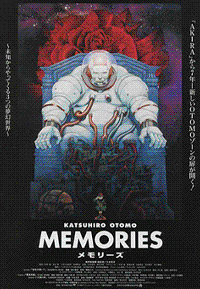
Memories: Magnetic Rose is a showcase of that golden era of anime (pre-2000s), with beautifully hand-drawn sequences and breathtaking acrylic backdrops. Props to the animators, they really knocked my socks off with how fluid the animation is here. The short film takes place somewhere in space following a crew of space scrap collectors. Something to truly admire when watching this film is how, specifically, the bodies are animated in space. I would assume it's hard to replicate the physics of weightlessness, especially with hand-drawn animation, but it is done flawlessly here. There's a scene when our two main characters, Heintz and Miguel, experience the transition from anti-gravity to gravity. The change in physics is depicted so incredibly in that scene: Miguel struggles to get off the floor and you can really feel how hard it is.
The painted backdrops are also visually stunning as well. It kind of makes me wish the pre-2000s anime look came back. There's an appreciation to how much work had to be done to make stuff back then that's lost on me now. . .but enough about how great this film looks; what about its story? It's pretty good. Nothing to write home about and it has an interesting premise. The collective delusion both Heintz and Miguel go through is entertaining and almost frightening to watch, but I couldn't help but feel kind of disappointed at the end. Despite how massive the ship is (I'm going to call it The Rose), we don't really get to see that much of it. Maybe I'm being greedy here, but if the film was maybe an hour longer I would have enjoyed it more. Contrary to other short sci-fi films that I've scene, like La Jetée, Magnetic Rose could have benefited from being maybe a half-hour to hour longer. There are a lot more interesting things to explore when it comes to a story like this.
Other than that, this was a pretty solid watch. It's good, and it's fucking beautiful. . .I just wish I got more out of it than I expected.
Rating: Bring back celluloid animation and enough with this digital crap!
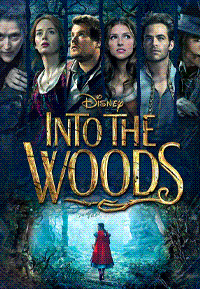
Into the Woods is 2 hours long, but it somehow feels like 4. Just fucking awful pacing and character work. There are too many people here to care about, and the worst of all is James Corden's character Mr. Baker, who is so squeamish and annoying he puts Shinji Ikari to shame (only kidding!). The cast is so incredibly stacked, ranging from newer stars like Anna Kendrick to hardened veterans like Meryl Streep, but the characters are just not interesting enough for me to like any of them.
There is so, so, so much music in this that it's nauseating. No offense to theater kids, but this kind of music is just not that good. Most of the songs have these verses where characters bounce off each others last-said words and it doesn't make for a pleasant listening experience. I don't know, this just is not for me.
Rating: James Corden should just work retail.
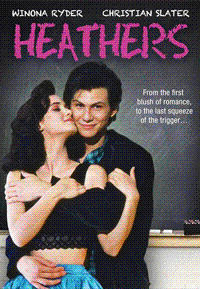
Heathers does something that most teenage movies fail to do: capture teenage angst in its entirety. Teenage comedies like Mean Girls or Clueless have a sort of 'notion' of what the high school life is like, but they always fall flat in their execution of these ideas. What this film does differently is that it doesn't pull any stops when it comes to angst, it is full steam ahead. A very constant theme (repeated ad nauseam throughout its runtime) is the idea that teens just want to be seen, and the way they structure themselves in high school is through different social strata. Divisions between "classes" of people make up the ecosystem of Westerburg, and these "classes" are some pretty familiar ones: the prim and proper beauties, the oafish and obnoxious jocks, the girl stoner, geekish nerds, etc.
What separates Heathers from a film like Mean Girls is that the story starts out with Veronica already part of the 'mean girls' clique. There is no scheme in the beginning for Veronica to infiltrate the girl group to enact some sort of coup; it is implied that Veronica initially desired to be a part of the group and the film starts out with her dealing with the guilt of successfully becoming that.
Jason Dean and Veronica represent the archetypal dysfunctional couple, with J.D. acting the role of manipulative boyfriend, and Veronica playing the manipulated girlfriend. Her whole arc is basically breaking from the 'social norm' of the high school, shedding the vampiric social-ladder-climbing self that lingers throughout the film.
All in all, a pretty perfect teenage comedy.
Rating: Christian Slater is soooooooooo attractive. . .
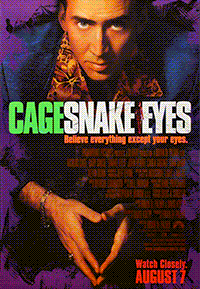
Right off the bat you're sort of jammed into the world of Snake Eyes. The setting and environment can only be described as chaotic. There's a hurricane, also there's a fight going on, and it's in a casino, and you get this long shot of Nicolas Cage walking around the fighting arena talking to various eclectic characters (including his wife and his girlfriend). De Palma gives you no time to breathe within the first couple minutes of the film: you are here for the ride.
Something that I particularly like about the film is that every character here is pretty much a slimeball--an exception made for Julia Costello, the gorgeous AirGuard whistleblower. Nicolas Cage's character, Rick Santoro, is a cop, and a very sleazy one at that. In the opening minutes of the film De Palma basically hammers you in the head with the notion that he's a morally questionable guy: he makes illegal bets on the fighters, he facilitates transactions for shady criminal figures, he extorts, he cheats on his wife, he lies, etc. Contrast this with Commander Kevin Dunne, an upstanding U.S. military commander who is there attending the fight to protect the Secretary of the State, and who is, as De Palma also tries to hammer in, a morally 'good' guy. He is loyal to his wife, he's never done anything sleazy in his life, what have you; this portrait of his character doesn't last very long though.
There's a scene I liked in the movie where Santoro is in the surveillance camera room--I think that's what you call it--trying to determine what exactly went down during the murder of the Secretary. He analyzes the fight footage and notices that Lincon Tyler, the heavyweight boxing champion, gets "knocked out" by a phantom punch. I thought that was a funny little tidbit because pretty much all the fight scenes, if you analyze the footage like Santoro does, are phantom punches. Just something I found amusing.
Other than that, this a very well-constructed thriller. It keeps you on your toes and doesn't waste time. I will say that I felt like it dragged on just a tad bit at the end, but that doesn't really detract all that much from the film. The most obvious highlight of the film is Cage's acting. There are those who criticize Cage for 'overacting' in a lot of his films, and they do so as a jab towards his acting props. And to that I say, fuck you, he's awesome.
Rating: Cage should play more characters with oily greaseball charisma
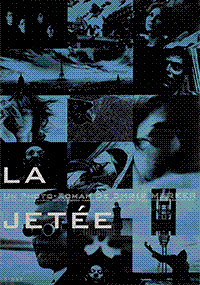
This is one of those Criterion 'essentials' that a lot of people talk about, and for good reason. This film is incredible. There's not a lot to say. It's such a simple story with an interesting way of presenting the story: still images.
There are films you come across that play with the medium of film itself as a way to elevate the story. I remember the first time I watched Fight Club dir. by David Fincher. Despite how overplayed its reputation is as a the archetypal 'greatest film of all time' for teenage boys, it genuinely is a great film. When I saw it at a friend's house in 2018, I remember feeling completely blown away. When Tyler Durden would show up for just a frame in the background, or when the film burns away when explaining his history, or the moments where Tyler would look directly into the camera and acknowledge the audience: these were all things I had never seen before in a movie.
I had the same feeling when watching this film. I'm sure there are plenty of films out there that I haven't seen that utilize this sort of slideshow storytelling method, but this film does so effectively. At the beginning I was kind of apprehensive to the still images, but after the the first minute I was acclimated.
There's not really a lot to say about the film. The story is simple and doesn't go anywhere too crazy. The ending is predictable, but it doesn't depreciate the film. It's simple and effective storytelling. The moment that really stuck with me was when the still images slowly faded into a moving image. I'm not sure how to explain it, but that was the moment I was like, "yeah this is really good."
Rating: really really really fucking good

It's going to be tough to describe the masterful work of this Miyazaki film without spoiling, so here's an obligatory spoiler warning! (If you haven't watched this yet, then this "review" probably won't make a lot of sense.)
I remember the first Ghibli film I had ever watched--partially. I caught around 30 minutes in the Texas Children's Hospital waiting room, at around 10 years old, of Howl's Moving Castle. I remember being completely entranced before snapping out of it after being called on by the nurse for my checkup. There was a certain quality about what I was watching that was different than most of the typical western animated films; it was enchanting. It was right around the part where Howl's castle appears trudging through the high plains, with Sophie gawking at it's monstrous presence, before she boards the castle. That scene was the only thing I remembered of the movie clearly, until I watched it in full years later.
Now, after seeing pretty much every film in Miyazaki's filmography, we come to The Boy and the Heron. This film when it was announced was marketed solely off of Miyazaki's name; his return to animation after his seventh retirement, originally announced under the title How Do You Live? When I heard that this would be Miyazaki's rise out of retirement I was excited, but also a little disappointed. His previous film, The Wind Rises, was--in my opinion--a perfect end to his career. I had watched it multiple times and felt that it was a fitting conclusion to an incredible career: a self-examination of Miyazaki himself told through the story of chief engineer of the Mitsubishi A6M Zero fighter aircraft, Jiro Horikoshi, during WWII.
The message I drew from The Wind Rises was a self-reflective one. Despite how whimsical and childlike Miyazaki's worlds were, he was infamous for being a nihilist, and sort of an asshole. He would yell at animators for not recognizing his vision, he was dismissive of his family members when making his films (there is a well-known story of him being cold towards his son for not being that good at animation), and he held a hatred towards humanity. The message in The Wind Rises is consistent with his worldview: no matter how pure his intentions were when making his films, he always had to sacrifice something in order to make them. Jiro's fighter aircrafts acts as an allegory for Miyazaki's films.
However, if The Wind Rises acts as a reflection on Miyazaki's legacy, then The Boy and the Heron acts as a hopeful look into the future. To frame these two films within the context of his legacy, if The Wind Rises is Miyazaki saying, "What have I done?" then The Boy and the Heron is him saying, "I've done all I can."
There's a particular moment near the end of the film where the grand uncle gives Mahito the opportunity to take over the tower, to become its pure-hearted maintainer. It's made clear throughout the film that the grand uncle is attached to this world he's created, pretty much to the point of obsession. However, when Mahito refuses his offer, the grand uncle doesn't react negatively. In fact, how I saw it, the grand uncle became relieved. No longer would this broken world be upheld by the hands of a singular person; it shall crumble. And that's the beauty of the film. Despite how nihilistic Miyazaki is--at least the nihilism he shows to media outlets and camera crews--there is an optimism that acts as the driving force and ultimate conclusion of the film. Even if it all comes crashing down, it can always be built somewhere else, by someone new. My interpretation (and many others) is that Miyazaki is both Mahito and the grand uncle. The grand uncle represents Miyazaki's obsession. Decades dedicated to the project that is Studio Ghibli, a legacy that he would like to continue through his son. Mahito represents Miyazaki's acceptance that such a legacy is impossible. That no matter how pure-hearted his intentions were, he was not able to change humanity for the better--essentially, he sacrificed so much for nothing. But that's okay. Because you can just build a new tower.
The ending, no matter how abrupt some people thought it was, left me speechless. For the first time, I saw a Miyazaki film where he spelled out, in plain animation, exactly what he wanted to. It can be considered a cliche, but ultimately its true: change happens, and it's okay that it happens.
Rating: Miyazaki don't go please
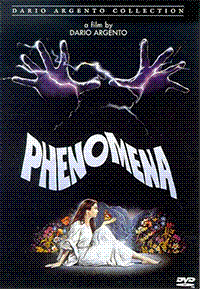
This film is such a drag in the first half, but it quickly makes it up by how unbelievably bat-shit crazy it is in the second. This is my first Argento film, and it's very clear what kind of movie this guys makes. The crazy and weird pacing & editing, the very blatant horniness, the amount of times people get stabbed, the lighting, camerawork; it all culminates into a very distinct and unique style of filmmaking that I have never seen before.
For the most time this movie is entertaining, but I would be lying if I said I was following it the whole time. You can't really prepare yourself for this film. Things move so unbelievably quickly that it's almost impossible to really understand what is really going on. The main character, Jennifer, is a bug telepath, and a bug scientist has a chimpanzee assistant. It's genuinely such a strange movie that I couldn't help but be charmed by it. It's gross, but it's also playful?
I might have to watch this again to really take it all in. I feel like the second half picked up so fast that I kind of just got waterboarded with the insanity that happens during it.
Rating: What the hell!
